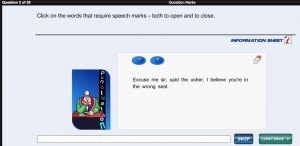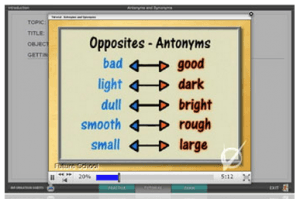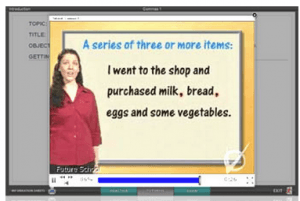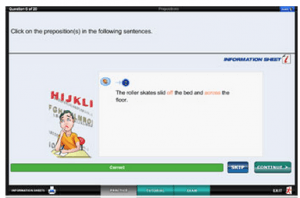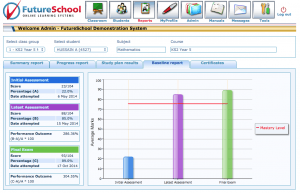Learn English with FutureSchool

The FutureSchool English programme is an integrated basic online literacy programme that includes both English grammar and reading. It has individual lessons that focus on: reading comprehension (literal), phonics, spelling, vocabulary development, punctuation, parts of speech, sentence construction, word usage, common errors, figurative language and writing skills. It is not to be confused with English Literature, which is something quite different as this refers to ‘the body of written works produced in the English language by inhabitants of the British Isles (including Ireland) from the 7th century to the present day.’ In layman’s terms, our programme does not touch on the reading and review of novels, plays and poetry. Nor is the programme about learning to speak English – this can be found on our Discovering English programme page.
The FutureSchool English programme focuses on those core skills required by all students to learn to read and write English fully, correctly and with style. The programme is structured to cater for students from the early primary years through to secondary students and adult learners. The lessons have been carefully graded to match students’ capabilities and interests. Within the programme there is significant revision of the more formal grammatical elements so that students can revise and practise their skills.
The online english programme encourages participation without the danger of exposing students to the stress involved in performing (reading) for others. The more formal Grammar lessons provide instruction in the areas of literacy and language. These lessons fulfil most of the requirements for school systems throughout the world.
The English programme covers the following key components of written English:
Reading Comprehension
Students will develop their literal reading comprehension skills by reading, listening to, and interacting with a variety of text types.
Vocabulary Development
Students increase and use new words and learn how to identify and use figurative language.
Punctuation
This often least-liked topic can make the world of difference to the meaning of a sentence or passage. Students will cover all aspects of punctuation from full stops to the dreaded correct use of the apostrophe.
Parts of speech
Students learn to identify and use various parts of speech from the basic nouns, verbs and adjectives, to the more complex form of pronouns and gerunds.
Spelling skills
Students learn various techniques to improve their spelling, from spelling lists to distinguishing short and long vowel sounds, prefixes and plurals.
Correct Usage
Students will learn to use words correctly and structure their sentences correctly. This includes being able to identify and use comparative and superlative adjectives, the correct tense of verbs: past, present and future, the case of nouns, pronouns and adjectives and eliminate some common errors in spelling and punctuation.
Improved Writing Skills
Students will learn how to improve their writing skills by being able to identify and use phrases including adjectival and adverbial phrases, construct expressive sentences by using adjectives, adverbs, phrases and clauses, identify and use active and passive voice, and recognise the elements needed in writing different types of essays.
Full Topic List for Grammar
This is a summary of the topics covered within the Grammar programme, but it is not a list of lessons, as there are over 2,000 lessons in total. Click here to see a full list of all topics covered.
